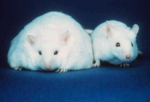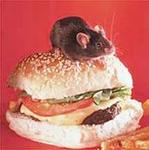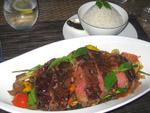|
Taking your nutrition advice from the media is pretty silly, these people are journalists, not nutrition qualified and they sure as heck aren't interested in putting time into reviewing the science they're writing about to see if it's even true. What journalists do is read a random Press Release that was sent to all major news media, and base their so-called news story on that. I used to work in media, writing commercials, and guess what, I never researched whether the so-called health claims were true or not, none of us did - we just wrote an ad from what the client gave us. It is foolish to take your nutrition advice from a media source with no nutrition qualifications. It's like getting Real Estate advice from playing Monopoly. The way we can tell that this piece of news was based on a screaming Press Release is because of these 3 things: · It had an alarmist headline and the same headline was on all news media. There is a saying in media "If it bleeds, it leads". What that means is that the more dramatic and bad a headline sounds, the more views it will get. And as for it being on all media, it had to be a press release, I don't think 100+ journalists simultaneously came up with the same headline. · It had the same body copy, this clearly had to be sourced off the same document - AKA, a press release. I don't think each news source went out and copied the information from their competitors. · The information popped up on all major news sources within hours of each other, so they all received the information at very much the same time. This is how a press release works...it is released to all press, all at once. *Yeah, ok Stace so it was from a press release, so what?* The researchers REALLY wanted the world to see this study, why? I don't know exactly why, but I do have my suspicions. |
You have to actually read the study to see where the glaring errors are, you'll never pick it up off the news reports or press release. So here are some key points you need to know: · Nowhere, in the entire human study was it mentioned what type or quality of protein the participants were eating. There is no mention of the quality or quantity of the rest of the diet, nor the other environmental factors that contribute to disease. For all we know, the people with the highest mortality could have been eating luncheon sausage sandwiches every day washed down with a Coke and in a state of extreme stress. The researchers are trying to deter us from eating animal proteins yet they have failed to prove this conclusively, there are just too many questions around the participants and their diet and lifestyle. · Valter D. Longo was the main researcher on the study, he has a financial interest in a food company that produces soy based "diety/fasting" food. Is this research really about longevity from the perspective of caring about humans, or is it about scaring us all into eating soy? · In the mouse study, the mice were fed Casein and Sucrose pellets. Casein is a protein, but is far from representative of all proteins. Milk, as we know is a food we give infants to help them grow. Milk is a growth food and whey and casein are hugely growth promoting proteins. Sucrose is a great growing medium for cancer cells, and that is precisely what the research showed, that Casein and sucrose is wonderful for growing tumours in mice.... certainly a far cry from animal protein in general right? So when it comes to this research, the way it was conducted appears to be skewed to produce the preferred result for the researcher. A researcher who, remember, has a financial interest in soy products. When you are testing proteins, you don't just test one protein, and particularly one protein that isn't even supposed to be in our diet past infancy (a debate for another time).  · These mice were also fed soy pellets. Nowhere in the research does it tell us when and how much of the soy was used. But let's use some logic here. The researchers are testing the hypothesis that *animal *protein has negative health effects right? So why would a researcher use soy pellets (*vegetable* protein) in the high protein part of the study? Surely they wouldn't, otherwise their hypothesis can't be proven. I can only assume Casein was used in the high protein diet and in the low protein portion, probably Soy and maybe Casein. So we can see that there are a few big things that don't make sense in this study, and it sure doesn't make sense to create a headline "protein as bad as smoking" especially since only one type of animal protein (dairy) was used in the mice study. The research did talk about restriction of specific amino acids being useful for longevity (methionine and tryptophan), but you still can't take a couple of amino acids and call this "protein is bad". IGF-1 is a protein, so of course it's going to be protein sensitive at some level. It'll also be nutrient sensitive, but I don't see any studies scaring you into reducing magnesium or whatever nutrients are involved in IGF-1 synthesis.   In my opinion, this research was made so public and so loud because it was just another piece in the great soy debate. The soy debate has a few different parameters; on the surface it is about soy being the greatest health giving food on the planet, but under the surface "Soybeans produce significantly more protein per acre than most other uses of land" (Wikipedia). Soy is also versatile enough to be in EVERYTHING! It's such a profitable food to produce, and we could assume that the bigwigs of the world see soy as a way of feeding our rapidly expanding world population. There is some merit to this concept I think, but I don't think soy is that healthy for everyone at all, and this is where the debate lies - Is it, or isn't it. *Some questions I want answered:* · Grants for the research were provided by the US Government via NIH and NIA. What are the benefits to the US Government if we all got scared off meat and ate soy? · When did the researchers use Casein pellets on the mice and when did they use the Soy pellets? Would they get the same results if they used all Casein or all Soy? · What exactly was the makeup of the diets of the humans researched? What was the quality and quantity of the entire diet? · Would grass fed beef / free range, organic chicken / wild pork etc along with fruit, veges, nuts and seeds produce the exact same results if this study was replicated? In other words, a healthy but non Standard American Diet. · What would the outcome be if mice were fed pellets closer matching their natural food sources (fruits/grains) as opposed to casein and sucrose? · What would the outcome be if mice were fed scraps of grass fed meats or insects etc? · Genetics plays a part in this IGF-1 issue, so I want to know, what genetic attributes did the humans have who died earlier? Did genetics contribute to their results? Were they already on the path to poor health before the study? *The only thing this study has proven to me is this:   · Mice fed dairy protein and sugar will experience tumour growth. Can we assume that dairy is the devil and not protein in general? Personally, I'm very interested in this, and I'd love to see more research done into dairy specifically regarding this health risk. · An increase in unknown protein sources whilst consuming The Standard American diet, MIGHT shorten the life of those aged 50-65 (genetic information pending) · It's easy to get tricked by big bold scary headlines. · Research is great, but only if it can be honest and transparent. So, it is business as usual with your protein consumption, and there's no need to take up smoking as a replacement. Now, we do know that moderation is sensible, and there are a lot of people who are eating way too much protein (and/or dairy and grains) and/or not enough vegetables. So these are some more sensible points to consider, and we don't need a scary press release to tell us to be mindful of balancing our food consumption....do we? Stacey Hancock www.staceyhancock.co.nz |




